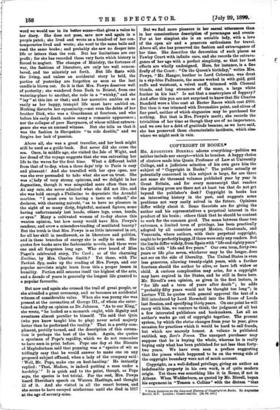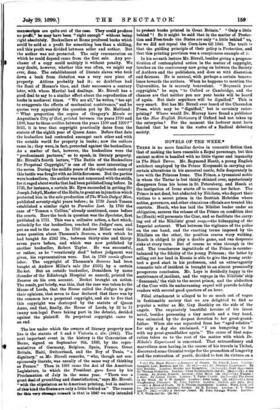COPYRIGHT IN BOOKS!
MR. AUGUSTINE BIRRELL adorns everything—politics we neither include nor except—which he touches. A happy choico of electors made him Quain Professor of Law at University College, and a judicious selection of his own gave him the subject of " Copyright in Books." The public actually or potentially concerned in this subject is large, for are there not some six thousand volumes published year by year in Great Britain, and for every manuscript that reaches the printing press are there not at least ten that do not get beyond the publisher's desk ? Copyright in books has an interesting history in the past, and suggests some problems not very easily solved in the future. Opinions differ widely about it. Some theorists are for giving the author and his representatives a perpetual interest in the product of his brain; others think that he should be content to work for the common good. The mean between these two extremes, a limited term of privilege, has been practically adopted by all countries except Mexico, Guatemala, and Venezuela, where authors, with their perpetual copyright, ought to be perfectly happy, if there were only any readers. But the limits differ widely, from Spain with "life and eighty years" to Chili with "life and five years." Our own term, forty-two years or life plus seven, whichever may be the longer, does not err on the side of liberality. The United States is even less generous, allowing twenty-eight years, with a further fourteen should the author be alive, or have left widow or child. A curious complication may arise, for a copyright may have expired in the States, and be still in force here. Mr. Birrell's own opinion, as given in the first lecture, is " for life and a term of years after death"; he adds "probably fifty years would not be thought too long"; in Lecture VII. he quotes with general approval the text of a Bill introduced by Lord Herschell into the House of Lords last Session, and specifying thirty years. On one point he will carry with him, we venture to think, the judgment of all bat a few interested publishers and bookmakers. Let all an author's works go out of copyright together. The present system, by which the status changes from year to year, gives occasion for practices which it would be hard to call frauds, but which are scarcely honest. A volume is published entitled, say, Zero's Poems. The unexpert purchaser may suppose that he is buying the whole, whereas he is really buying only what has been published for not less than forty- two years. We have even seen a preface suggesting that the pieces which happened to be on the wrong side of the copyright boundary were not of much account.
Copyright, as a well-defined privilege, giving an author an indefeasible property in his own work, is of quite modern origin. Yet there was something like it in Rome, if not in Athens. When Wedderburn, as quoted by Mr. Birrell, began his argument in " Tonson v. Collins" with the dictum "that
Seven Lectures on the Law and History of Copyright in Books. By Augustine Blrrell, M.P. London : Cassell and Co. [3s. 6d. net.] manuscripts are quite out of the case. They could produce no profit," he may have been " right enough" without being right absolutely. Booksellers at Rome produced books which could be sold at a profit for something less than a shilling, and this profit was divided between seller and author. But the author was not protected. The only remuneration on which he could depend came from the first sale. Any pur- chaser of a copy could multiply it without penalty. We may doubt, however, whether this was often, we might say ever, done. The establishment of literate slaves who took down a book from dictation was a very rare piece of property. Atticus probably had it ; so doubtless had the Sosii of Horace's time, and their successors a century later, with whom Martial had dealings. Mr. Birrell has a good deal to say to a similar effect about the reproduction of books in medi2val times. " We are all," he writes, " too apt to exaggerate the effects of mechanical contrivance," and he quotes very appositely the question put by Dr. Maitland : " What proportion the copies of Gregory's Morals or Angustine's City of God, printed between the years 1700 and 1800, bear to those written between the years 1100 and 1200 ? " Still, it is true that copyright practically dates from the statute of the eighth year of Queen Anne. Before that date the booksellers had contended amongst each other and with the outside world for property in books ; now the authors came in ; they were, in fact, protected against the booksellers. As a matter of fact, however, the booksellers were the " predominant partnere," so to speak, in literary property. Mr. Birrell's fourth lecture, "The Battle of the Booksellers for Perpetual Copyright," is one of the most interesting of the series. During the middle years of the eighteenth century this battle was fought with no little fierceness. But the parties were booksellers; the author was not concerned with the strife, for it raged about works that had been published long before. In 1735, for instance, a certain Mr. Eyre succeeded in getting Sir Joseph Jekyll, Master of the Rolls, to grant an injunction which protected him in the sole production of The Whole Duty of Man, published seventy-eight years before ; in 1739 Jacob Tonson established a similar right to Paradise Lost. In 1760 the case of " Tonson v. Collins," already mentioned, came before the courts. Here the book in question was the Spectator, first published in 1711. This was a collusive action, a fact which, unluckily for the booksellers, reached the Judges' ears, and put an end to the case. In 1766 Andrew Millar raised the same question about Thomson's Seasons, a work which he had bought for £242 10e., between thirty-nine and thirty- seven years before, and which was now published by another bookseller, Robert Taylor. He was successful, or rather, as he "vexatiously died" before judgment was given, his representatives were. But in 1769 omnis effusus labor. The copyright of Thomson's Seasons had been bought at Andrew Millar's sale (for £505) by a certain Becket. But an outside bookseller, Donaldson by name (founder of the Edinburgh Hospital so named), printed the Seasons on his own account. Becket brought an action. The result, put briefly, was this, that the case was taken to the House of Lords, that the House called the Judges to give their opinions, that seven to four declared that there was by the common law a perpetual copyright, and six to five that this copyright was destroyed by the statute of Queen Anne, and that, finally, the House of Lords, by 22 to 11 (many non-legal Peers taking part in the debate), decided against the plaintiff. So perpetual copyright came to an end.
The law under which the owners of literary property now live is the statute of 5 and 6 Victoria c. xlv. (1842). The next important event in the history is the Convention of Berne, signed on September 9th, 1886, by the repre- sentatives of Germany, Belgium, Spain, France, Great Britain, Haiti, Switzerland, and the Bey of Tunis, " a dignitary," as Mr. Birrell remarks, " who, though not con- spicuously literate, was usually of the same way of thinking as France." Then in 1891 came the Act of the American Legislature, to which the President gave force by his Proclamation of July in the same year. " There was a great deal of grumbling and dissatisfaction," says Mr. Birrell, " with the stipulation as to American printing, but in matters of this kind the States are only a little behind us." The reason for tkiis very straeage remark is that in 1842 we only intended to protect books printed in Great Britain." " Only a little behind"! So it might be said that in the matter of Protec- tion and Free-trade the States are only "a little behind" us, for we did not repeal the Corn-laws till 1846. The truth is that the guiding principle of their policy is Protection, and that this printing provision was a conspicuous example of it.
In his seventh lecture Mr. Birrell, besides giving a prognos- tication of contemplated action in the matter of copyright, touches on the controversy now going on between the Society of Authors and the publishers, and does so with discretion and fairness. He is neutral, with perhaps a certain benevo- lence towards the authors. When he happens to mention the Universities, he is scarcely benevolent. " Bequeath your copyrights," he says, " to Oxford or Cambridge, and the chances are that neither you nor your books will be heard of again. But their sepulture will be dignified." This is very smart. But has Mr. Birrell ever heard of the Clarendon Press, which may be " dignified," but is certainly enter- prising? Where would Dr. Murray have found a publisher for the New English Dictionary if Oxford had not taken up the enterprise ? For the moment the lecturer must have fancied that he was in the rostra of a Radical debating society.



































 Previous page
Previous page